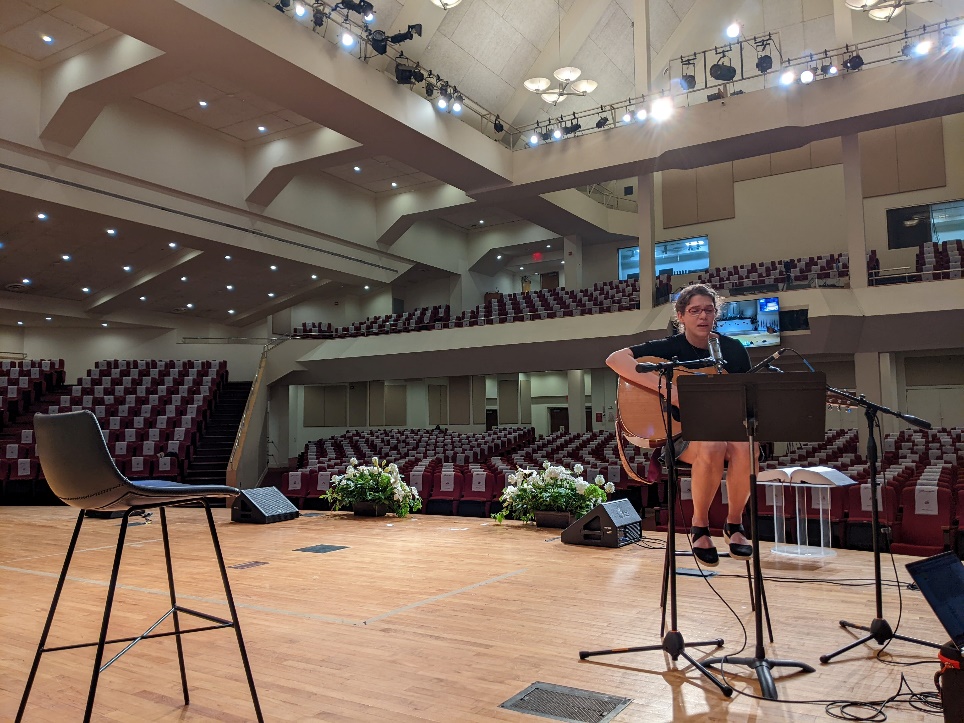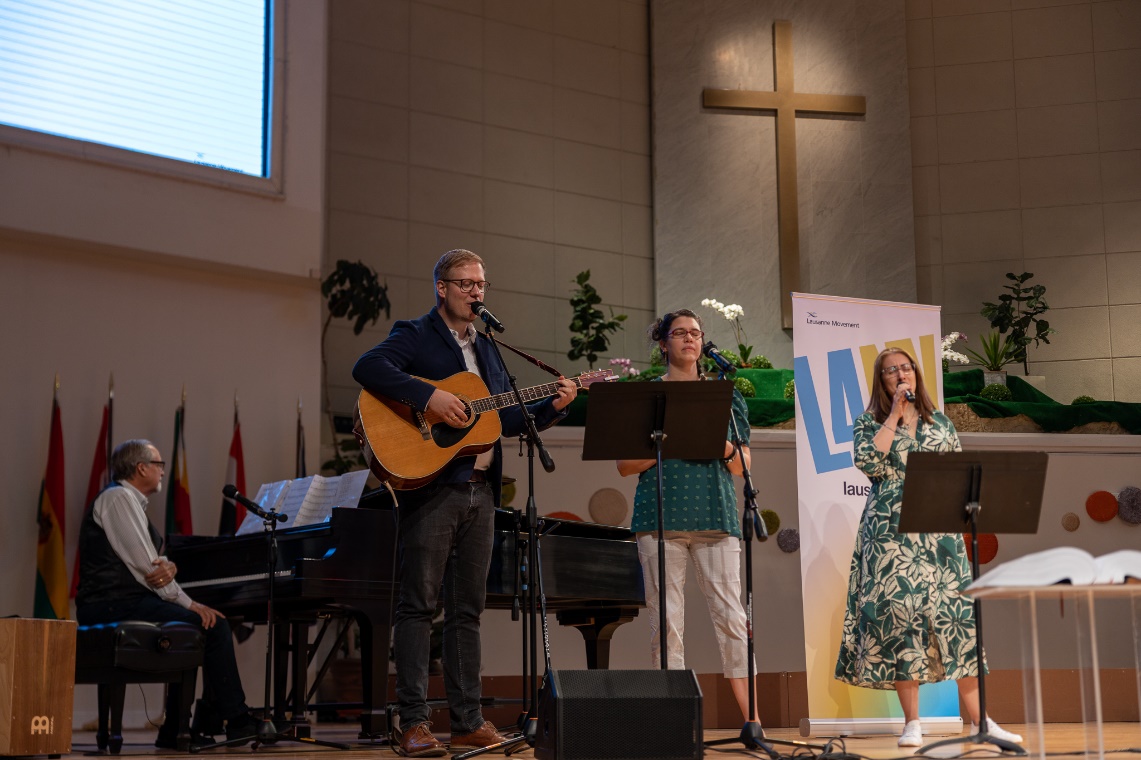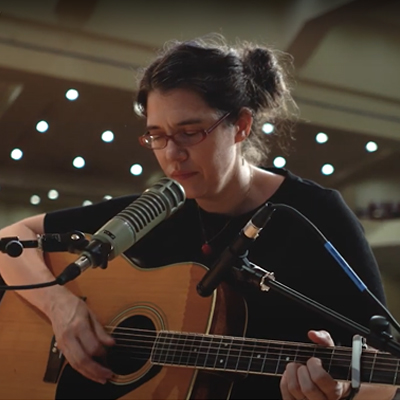As a member of the Programme Planning Team for the L4NY meeting in June 2022, which gathered together all the leaders of the Lausanne Movement in-person in New York City, I was in various Zoom calls where we discussed whether we should listen to the full book of Nehemiah during our time together in New York. I had been hearing Nehemiah’s name come up as the broader L4 vision gains differentiation and articulation. In fact, some of the key collaborative initiatives of the L4 process and Seoul 2024 are named for Ezra and Nehemiah. When the decision was made that Nehemiah would be a scriptural anchor for L4NY, I made a decision in a deep place in me: I would write a Nehemiah song for L4NY. And I would only utilize words right out of Scripture. This has been a personal songwriting trick of mine to help me memorize Scripture, but I also wanted the song’s meaning to be easily translated into all the heart languages from the 45 nations that were being brought to L4NY.
Nehemiah is a book about rebuilding the ruined walls of Jerusalem after the nation of Israel’s exile in Babylon. What does Nehemiah have to say to a missionary unexpectedly returned from her mission field, with much confusion and gnarly loss in her luggage? What does it say to a Lausanne staff member looking ahead at the world in 2050, alarmed at the church’s—and her own—unpreparedness to bring useful tools for rebuilding?
I have been in a season of assessing the ruins—and learning God’s narratives of those ruins—in my own personal and ministry life, as well as in the global church, as we move from ruin to ruin on our way toward glory to glory.
But still, the songwriting nearly didn’t happen. In the accumulating stresses leading up to L4NY, I considered dropping my intention to write the song. What would it matter if the song wasn’t there, anyway?
However, with the refrain of my pastoral counselor’s words, ‘worship is sanity’, in the back of my throat, and because of the accumulating stresses, I sat on the floor of my room with my guitar and did what I know to do.

That evening, I asked God to make a song with me. And I asked Him to do it quickly, please, because I was leaving for L4NY in a week, and there was no song in the space where a song should be. In the previous weeks, God had been compiling all the materials for building this song. I had scrawled verse references on corners of receipts in my car as I drove and listened.
I had caught the ‘song lyrics’ of Scripture; I just needed to net them into melody.
This song was made that evening. It was then tested by two trusted brothers (Darius Kuhl and Troy Lucia) and built stronger by their gifts and affirmations. I put the song in my suitcase for L4NY.
The process of bringing ‘Nehemiah Song’ to the hearts and mouths of the L4NY participants re-emphasized a few deep bones about worship for me.
Worship is sanity.
During the time in New York, I was encouraged and gutted by the stories from the saints. Satan wants to steal, kill, and destroy, just as freshly as he wanted to in the first garden. And it seems that one of Satan’s latest pressure points is the mental health and well-being of Christians.
My dear friend Nana Yaw Offei Awuku said to me in New York, ‘Look up. Keep looking up—like you do when you worship. Don’t look all around at what is surrounding you.’ My dear pastoral counselor’s words of ‘worship is sanity’ underscore Nana’s words.
Worship is an intentional looking up, a stepping out of the world’s winds and into the Spirit’s wind. In worship, we fill our time, our minds, our spirits, and our mouths not just with an activity for God, but with the character and substance of God himself.
Worship is weaponry.
Jehoshaphat and the Israelites learned what worship is in 2 Chronicles 20:21-22:
After consulting the people, the king [Jehoshaphat] appointed singers to walk ahead of the army, singing to the Lord and praising him for his holy splendor. This is what they sang: ‘Give thanks to the Lord; his faithful love endures forever!’ At the very moment they began to sing and give praise, the Lord caused the armies of Ammon, Moab, and Mount Seir to start fighting among themselves. (NLT)
I am personally very moved by this image of singers on the front lines of the battle. Because here we see that praise is not merely decoration for a Christian life. It is a weapon.
What was it like for those enemy armies to hear praise at a site where Satan was poised to steal, kill, and destroy? It must have been disorienting, disruptive. The worship of God made a miraculous way forward when Israel was ‘powerless against this mighty army that is about to attack us’ (2 Chron 20:12b).
Worship was a warring posture for God’s people. Looking up in worship seems to be a powerful posture for advancing forward.
As I pray about (and honestly, worry about) the world in 2050, I do not know the best ways to move forward. But I suspect one way to advance forward will be putting God’s musicians, singers, creatives, writers, dancers, artists out on the front lines. To entrust them with the work of the holy disorientation and disruption of the patterns of the world; to support them in planting seeds of beauty and questioning and creation.
Worship together.
One of my greatest anticipated joys of being at the L4NY meeting was the opportunity to worship in person with 200 core Lausanne leaders. We could finally sing together! We would no longer have that awkward lag time of internet connection that had made true singing together with the global body impossible for so very many Zoom room months.
Worshipping together does something; it builds something. There is something precious in singing together with you, next to you, your breath moving; your body is there; mine, too. And we are inhabiting that space of looking up at the same moment. Our praises stack together; weave. Collaborate.
And when we as a Lausanne leadership met in person in New York, how great was our joy.
We got to sing together and pray together and worship in Spirit and in truth together.
We made harmony!—that is also keenly impossible over Zoom. In partnership, Darius Kuhl (co-worship leader for L4NY) and I gathered together musical gifts hidden within the Lausanne family.

Left to right: Byron Spradlin, Darius Kuhl, Darcy Staddon, and Karen Bomilcar
So we got to enjoy the musical gifts of Bob Doll (chair of the Lausanne board of directors) and of Larry Russell (chief operating officer). We were blessed by the gifts of some of our catalysts: Ricki Gidoomal, Karen Bomilcar, Byron Spradlin, and Desmond Henry. Some of our Lausanne staff sang: Naomi Deckert and Amy Hurst.
Regional Directors Michael El Daba and Usha Reifsnider sang a blessing over us in Arabic. We were blessed in Urdu by staff member Yaksan Azam. We welcomed two musicians from Bethel Gospel Tabernacle in Jamaica, Queens, to lead worship with us for a session. We had continents leading other continents.
And so this worship team brought ‘Nehemiah Song’ to the Lausanne family at L4NY. The gathered leaders were generous with another new song, and we all sang it together in greater collaboration yet.
In the final hours of the conference, the Communications Team asked if I might be up for making a quick video recording of the song: ‘It would have to be right after the last lunch; it would have to be a video done in just one take.’
My answer was yes. It was yes for many reasons. But the greatest reason may be that Stephen Mbogo, regional director for EPSA (English, Portuguese and Spanish-speaking Africa) asked if there would be a recording so he could use the song easily when his church community studies Nehemiah. Yes, because the song is a gift for Stephen and his church. For Lausanne and brothers and sisters in Christ around the world. For our God.
I hope the song encourages you. And please freely share the song through the free resources (chord charts, lyrics, and piano lead sheets) on my website.


